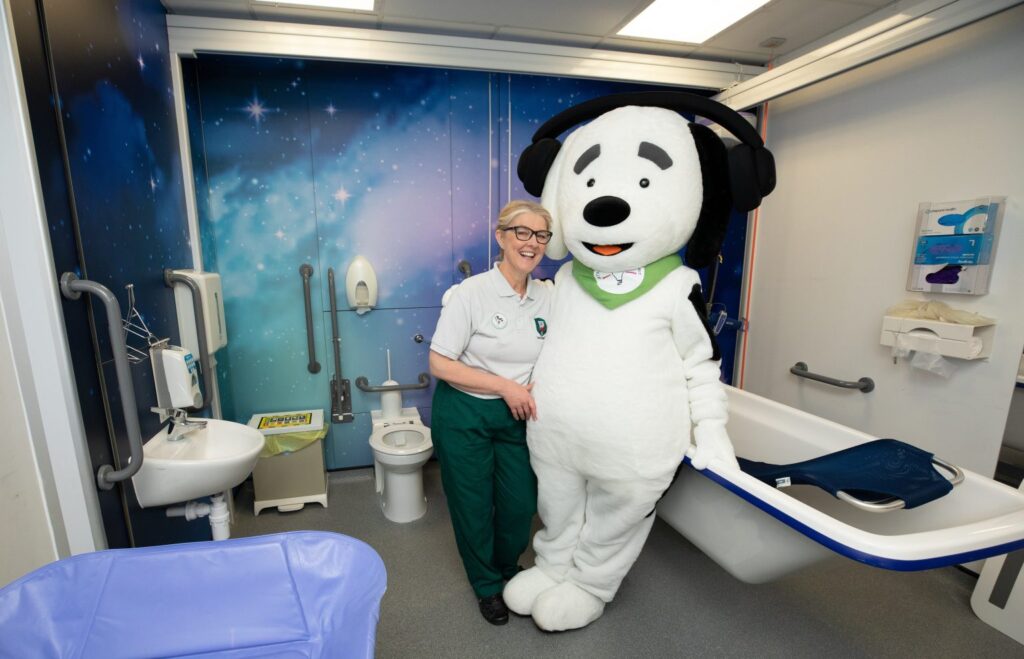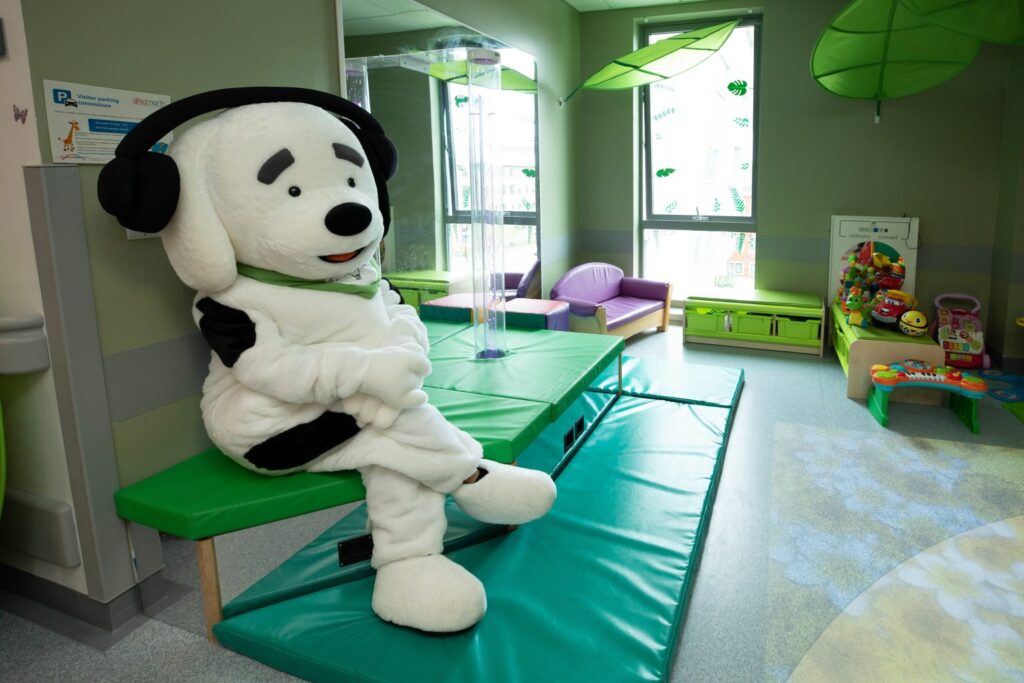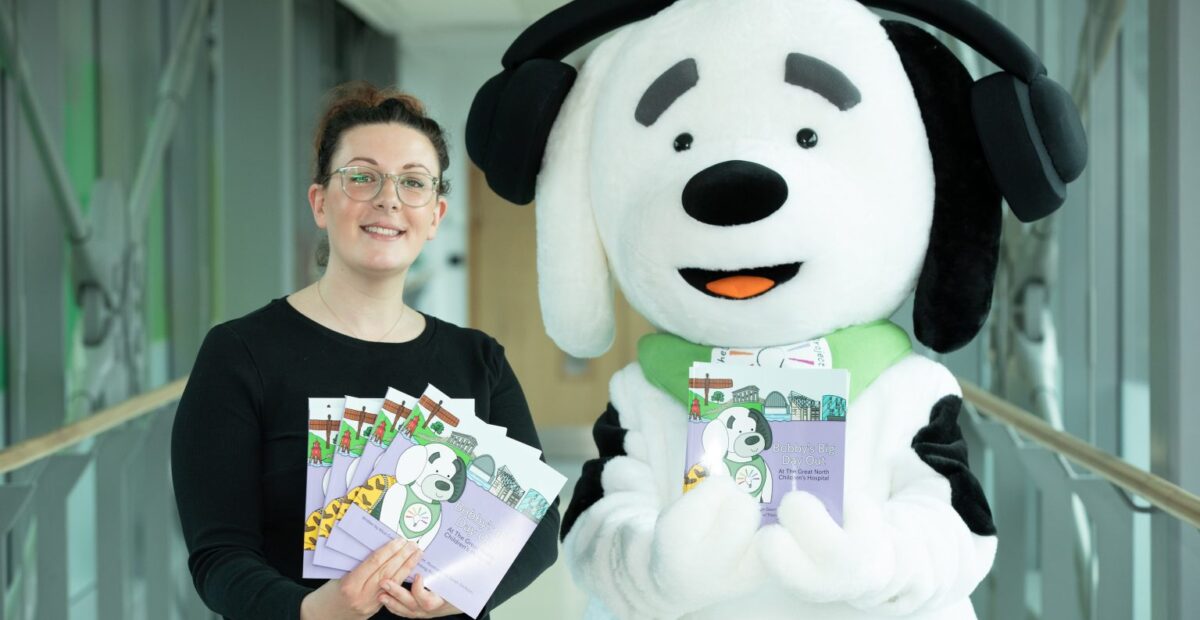Project
Clinical entrepreneur and occupational therapist Alice Gair created ‘Bobby’s Big Day Out’, a children’s short story book following mascot Bobby as he attends The Great North Children’s Hospital (GNCH) for an appointment.
Written by Alice and Philippa Gaunt, the book is a unique resource for autism spectrum condition (ASC) children and those who experience sensory processing differences; or who are nervous or worried about coming into our hospitals, their families and carers.
It aims to normalise being in GNCH by preparing the children, explaining the process and what they can expect in hospital so that they feel safe and comfortable ahead of and during their visit. Newcastle United Football Club’s players provided funding to support the publication of the book.
Those children who are referred into community therapy with functional differences due to sensory processing issues receive a copy of the book during their home information sessions.
The book is part of the resources created by the Sensational Thinking Project, which is currently led by occupational therapist colleague Cheryl Gascoigne. It’s a life-enhancing sensory initiative which was established five years ago to respond to a significant increase in referrals to occupational therapy for children experiencing sensory processing differences which were having a negative impact on how they engaged in everyday activities, their function and development.
Alice Gair is a clinical entrepreneur who secured a place on the national NHS Clinical Entrepreneur Programme to develop and grow her project.

What this means for staff
The book and wider project are supporting practitioners in the hospitals along with school staff, parents and carers with tailored sensory awareness sessions delivered by sensory integration trained occupational therapists.
The training raises awareness and understanding of sensory differences and how changes can be made in daily activities to improve the experience of children.
To date supportive resources include:
- Sensational practitioner training sessions giving attendees an introduction into sensory processing and how sensory differences can impact behaviour
- Short videos suggesting tools and sensory equipment
- Bobby’s ‘Top Tips’ posters for a range of settings including calm classrooms
- Sensory boxes
- Bobby’s bite-size introductions to movement breaks
- Bobby’s ‘Big Day Out’ book
How this benefits patients
Sensory processing differences are how we take in and make sense of the world around us and interactions. They significantly influence how we are able to do activities of daily living such as brushing our teeth, eating a meal, going to school and interacting with the people around us.
A simple thing such as coming in for a dentist appointment or to have blood taken can be a huge event for a child and a family with sensory processing differences that other families may take for granted.
It only takes one negative experience in hospital to put a child off coming in again, so if this is right first time it can have a very positive impact on their long-term health outcomes. To do this everyone in hospital needs to understand what sensory processing differences means and how they can make a difference.
Cheryl Gascoigne, occupational therapist.
Some wards and areas throughout the hospital have been given a calming sensory friendly makeover, and a sensory garden is being developed in one of the large courtyards at the RVI for use by patients.

How we helped
We collaborated with Alison on the project for two years providing specialist commercial guidance to support the development and roll out of the book. This included project management and specific tailored support such as sourcing local printers, financial oversight and legal advice relating to book’s copyright ahead of its publication.
Alice was the first occupational therapist in the country to secure a place on the Clinical Entrepreneur Programme and she became the first clinical entrepreneur with the programme for our trust.
She has received supported in areas including mentoring, networking, broadening her understanding of the wider healthcare system and accessing funding sources.
Developing the skills and mindset to overcome the many challenges that come with growing an innovation has also been a focus of ‘leadership in innovation’ personal development sessions.
Next steps
The Sensational Thinking Project team is looking at evaluating Bobby’s Big Day Out to gather evidence of the impact it’s having for this community. They are exploring other creative ways to use innovation to benefit this patient group and in turn how to best integrate this into their daily practice.
They are also producing a ‘story time’ video of the book being read complete with subtitles and translations to different languages.
The team is developing resources aimed at staff to further support them.
What would you say to colleagues who have an idea to develop?
Whatever stage you’re at in your career, and however ‘seasoned’ your idea is, it’s about harenessing it and working towards your vision. What I’ve learned from the programme I’ve put into clinical practice so it has enhanced my transferrable skills as well as being an entrepreneur.
The learning is flexible so you can access it face to face and remotely. I was matched really well with a mentor who is also a mother, which was fantastic as I’m a mum of two young children. I’ve been able to participate in the programme as well as maintaining a clinical role and being a parent.
Testimonials
I am delighted to see our pioneering occupational therapists celebrating the many successes of this wonderful initiative which has already made such a positive impact for so many young people living with sensory differences.
“The team have achieved so much since they sowed the seeds of their innovative ideas five years ago. I know that they will go from strength to strength as they continue to support many more families.”
Chief Executive Dame Jackie Daniel

